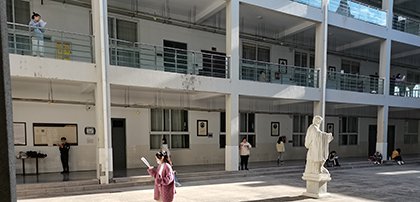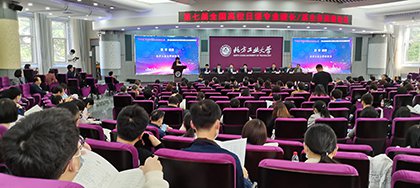The Japanese-Language Major is Under Pressure to Reform - What Should We Do? -
THE Japan Foundation, Beijing
IKEZU Joji, TANABE Tomonari, OOWAKI Gen
China faced the damage wreaked by the COVID-19 pandemic earlier than any country worldwide, and while uncertainties remain, it is the country that has succeeded in bringing the virus under control the fastest. Since it is becoming possible to travel between cities and hold small gatherings more or less without any problems, we are holding nationwide seminars using an online lecture format, and small-scale workshops of 30–40 people as regional traveling seminars. In this report, we would like to touch on our activities from the perspective of the challenges facing Japanese-language major courses at universities. There are more than 500 such courses offered nationwide.
In October 2020, having only just taken up our posts the previous month, we visited a university on the outskirts of a regional city for a regional touring seminar. We arrived at the location the day before the seminar and had a preliminary look around the university building that would serve as the venue. Here and there throughout the building, we spotted students sitting down with notebooks on their laps, murmuring out loud. It was not as though they had exams coming up – apparently this type of scene is commonplace. This is just how the students go about doing their ordinary study.

Students on campus, memorizing devotedly
This university is actually not officially a university yet – it is a higher educational institution referred to as an “academy.” Generally speaking, academies are three-year junior colleges, but after this academy was set up around 20 years ago, it adopted a four-year course structure and after building up a track record, it also became able to award bachelor degrees. Reportedly, it is at last expected to be promoted to university status both in name and in reality, in 2022. Between 2000 and 2008, the number of higher educational institutions in China soared from 1,040 to 2,263. This academy is no doubt one of them.
According to The Survey on Japanese-Language Education Abroad 2018 by The Japan Foundation, there are 827 higher educational institutions in China that offer Japanese-language majors, and of those institutions, 547 awarded bachelor degrees. By this year (2021), the Chinese government had begun pursuing a policy known as the “double ten thousand” plan to certify 20,000 “first-class undergraduate courses,” 10,000 at national level and 10,000 at provincial level. 42 educational institutions that offer Japanese-language majors are expected to be selected. Thus, of the overall number of institutions offering Japanese-language majors, less than 10% will be able to receive first-class certification from the government.
In the same month, October 2020, we also observed a class at a university in another province that has already been certified as first class. The class centered on a so-called grammar-translation method, in which the students were asked to read sentences they had translated in their dorm rooms, with the teacher commenting on the sentences one at a time. Since long ago, first-class students have been individuals that study by themselves. Then, they have been going out into the world as valuable personnel. It may be that this does not change from here on either, or it may be that this has to change.
In 2020, national standards (government guidelines for education) that were based on the “Li De Shu Ren” (Strengthen Moral Education for Cultivating People) announced in 2014 were implemented, and it became a requirement to ensure that learners acquired so-called key competencies even in university’s Japanese-language major courses. Amid ongoing globalization and the growth of artificial intelligence (AI), there is a strong possibility translating and interpreting will no longer be jobs performed by actual human beings. The fact is that Japanese-language learning must become a path for training students to become human resources capable of responding to the changes of the times, while equipping them with key competencies such as the ability to cooperate, the ability to think logically, advanced reading comprehension skills, expressive power, the ability to learn autonomously and so on.
Over the past few years, Japanese-Language Specialists at The Japan Foundation, Beijing have been implementing trainings along with people involved in Japanese-language education on the China side, in order to respond to the new national standards and key competencies. Each day we are compelled to think hard about how we should go about providing training from here on amid our congested schedules, which include carrying out a variety of training and symposiums both online and in person at junior secondary schools and senior secondary schools.
In April 2021, a senior forum for the heads of Japanese-language departments and major courses nationwide was held, and we participated as observers. It was a large-scale event that attracted around 230 participants. There were keynote speeches followed by a panel discussion and breakout sessions.

Senior forum for heads of Japanese-language departments and major courses nationwide
In the keynote speeches and panel discussions, authorities on Japanese-language education in China and influential teachers were unanimous in saying that going forward, rather than simply training as many Japanese-language speakers as possible, it will be essential to cultivate personnel who possess added value that capitalizes on the characteristics of respective universities. In addition to the Japanese language, they must also be equipped with the specialist knowledge sought by society, such as economics, law, and tourism.
In the final breakout session, participants split up into groups of just under 20 people and discussed the current conditions on the front lines and related matters. Many said that while they can understand the objectives and goals of the new national standards, the demands the standards make are likely to be too high for the average university student, who is not particularly outstanding, has low motivation, and is unable to study on their own. On top of that, it will likely be utterly impossible for such students to study a specialty of some kind in addition to Japanese.
While we were listening to these discussions, we heard that in one of the representative’s classes, the students are made to memorize vocabulary as homework, with the testing and grammatical explanation of that vocabulary carried out in the classroom. We had observed this same grammar-translation method approach at the first-class university. This representative was probably once an outstanding student who had also succeeded in learning Japanese in this way. However, this may not be suitable for the average student in the present day, when the number of students has increased.
Ordinarily, people do not become able to do anything solely just as a result of memorizing words and understanding grammar. You will not acquire a foreign language unless you talk to someone in that language, and read it and write it while thinking. Learning a foreign language in this way widens your world, and makes you grow as a person. This is something that begins from the start of the beginner level, not from the intermediate and advanced levels. Perhaps this is also one of the objectives of the national standards. Our activities always start from finding the point of contact between ideals and reality, such as this.
- What We Do Top
- Arts and Cultural Exchange [Culture]
- Japanese-Language Education Overseas [Language]
- Japanese-Language Education Overseas [Language] Top
- Learn Japanese-language
- Teach Japanese-language
- Take Japanese-Language Test
- Know about Japanese-language education abroad
- The Japanese-Language Institute, Urawa
- The Japanese-Language Institute, Kansai
- Japanese-Language Programs for Foreign Specified Skilled Worker Candidates
- Japanese Language Education for Japanese Children Resident Overseas and for the Descendants of Migrants
- Archives
- Japanese Studies and Global Partnerships [Dialogue]
- JF digital collection
- Other Programs / Programs to Commemorate Exchange Year
- Awards and Prizes
- Publications
